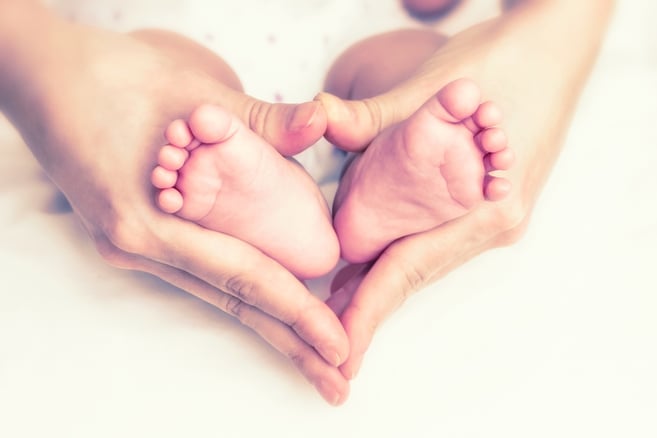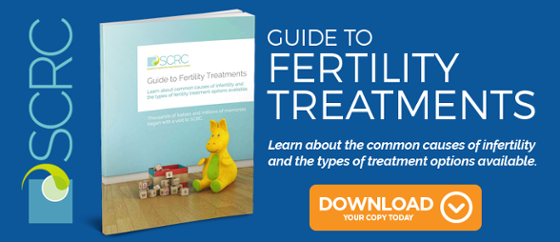
After a successful round of IVF, patients might wonder what they can expect from an IVF pregnancy. The process of achieving pregnancy with the help of assisted reproductive technologies (ART) can seem far removed from “natural” conception, and some women worry that this difference will continue into the pregnancy.
For most women, the answer is no: after the first few weeks, an IVF pregnancy is the same as a “regular” pregnancy in every respect, at least insofar as any two pregnancies can be compared. Every woman and every pregnancy is unique, no matter how the baby is conceived. With that in mind, let’s take a look at how an “average” IVF pregnancy proceeds.
The first two weeks
In the early days and weeks after embryo transfer, the biggest difference between a “regular” pregnancy and an IVF pregnancy is the level of awareness. Most women who become pregnant on their own don’t know that they are pregnant until a month or more into the pregnancy. For an IVF patient, that awareness begins the moment after the embryo is transfered. In practical terms, this can mean that you may be dealing with a higher level of anxiety and a greater sensitivity to early pregnancy symptoms than many women experience at this stage.
Early pregancy or pre menstrual symptoms
Complicating matters is the fact that the fertility medications you have taken during the ovarian stimulation phase of IVF can mimic the symptoms of early pregnancy. Even worse, many pre menstrual symptoms can do the same. It makes the dreaded “two week wait” between transfer and your official pregnancy test a particularly difficult time.
You may be feeling tired, bloated, nauseated, and moody without any assurance that you are actually pregnant. You may miss your period, or you may have one last light period or spotting. Some amount of cramping and light bleeding can occur when the embryo implants in the uterus. Changes in the breasts (such as heaviness and soreness) are a common experience in many early pregnancies, but no one symptom can give you an answer.
Home pregnancy tests taken during this stage are highly unreliable, as your body may still have elevated levels of hormones as a result of fertility medications. The only way to confirm your pregnancy 100% is to wait for the official test at the clinic.
Ovarian hyperstimulation syndrome symptoms
One thing to be aware of at this point is that the symptoms of ovarian hyperstimulation syndrome (OHSS) can resemble the symptoms of early pregnancy, so if you experience severe cramping, bloating, or nausea, you should immediately get in touch with your doctor, rather than assuming that this is a natural effect of pregnancy. OHSS can be a side effect of IVF and can affect women who are pregnant, so it is important to get medical advice as soon as possible if you suspect OHSS.
Most cases are mild and resolve themselves in weeks, but rare complications are possible. If you are pregnant with OHSS your symptoms may last 2 to 4 weeks after a positive pregnancy test. Your doctor will monitor you carefully to help you manage your symptoms during this time, but there are no known long-term risks to your baby associated with OHSS.
Take care of your body and mind
Constantly evaluating and guessing at symptoms is quite stressful for most IVF patients, but it’s difficult to avoid. It’s a good idea to step up your self-care at this point. Give yourself a break and be gentle with yourself physically and emotionally. Make sure you’re getting enough sleep and quality nutrition. Avoid high-intensity activity: low impact exercise such as gentle walks can help you manage stress, but anything more strenuous should be suspended.
Reach out to your trusted support network, whether that’s your partner, a close friend or family member, a professional counselor, or some combination of the above. If you have specific medical questions or concerns, don’t hesitate to ask your fertility team. They have been through this many times before and may be able to help you find some peace of mind.
2 weeks to 10 weeks
During this part of your pregnancy, you will remain under the care of your fertility clinic. The main difference at this time is that you will be monitored more intensively than a patient who conceived naturally. You may have appointments and ultrasounds every 1 to 2 weeks. You may notice typical pregnancy symptoms such as morning sickness, cravings, and increased urination.
10 weeks and beyond
At around 10 weeks, if all is well, you will be released into the care of a “regular” obstetrician. From that day forward, your IVF pregnancy at this point is indistinguishable from a “regular” pregnancy. Congratulations! While it may not be easy to stop worrying until your baby is safely in your arms after delivery, by 12 weeks most patients feel safe sharing the news of their pregnancy with their wider social circle.
After going through the rigors of infertility and treatment, you deserve to relax as much as possible. Continue taking care of your own health and wellbeing, and enjoy all the planning and preparation for parenthood that is such a special part of pregnancy.
Share this on social media:






